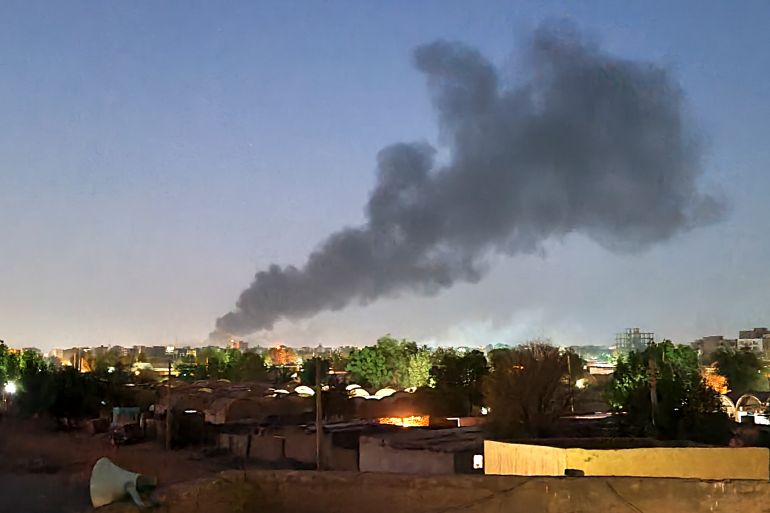Silencing dissent: Journalists in Sudan face threats, raids
Media workers say they’re being intimated by warring forces on both sides of the unrest for reporting human rights violations.

When Mohi el-deen Jibril checked his phone on May 11, he saw his name on a list of people accused of betraying the Sudanese Armed Forces (SAF) and supporting the paramilitary Rapid Support Forces (RSF). Instantly, he thought of leaving his war-torn country.
“Seven journalists appeared on the list, but I was the only one still in Sudan,” Jibril, 48, told Al Jazeera. “I have since received threats from many people. Two [wrote to me on WhatsApp] and said that after the army kills the RSF, they will come for me next.”
Keep reading
list of 3 itemsAnalysis: Saudi Arabia’s diplomatic energy, soft power in Sudan
Sudan fighting: One month on and no solution in sight
Since fighting erupted in Sudan between the army and the RSF last month, supporters from both sides have threatened journalists for criticising human rights violations by both sides, according to the Sudanese Journalists Syndicate.
The number of journalists who have been targeted or intimidated remains unknown, but Al Jazeera identified six people who were told that they would be hurt or killed if they continued reporting abuses.
Many others have appeared on lists circulating on social media, where those mentioned are accused of betraying Sudan in an apparent effort to incite violence against them. The list that Jibril was on was shared in a private WhatsApp group for Sudanese journalists, but he later discovered it on Facebook, too.
As a veteran television reporter, Jibril has been critical of the army for derailing popular aspirations for democracy by spearheading a coup in October 2021. Now, he fears he could be killed.
“I haven’t taken any position in the war, neither in favour of the RSF or army,” said Jibril. “But the people threatening me keep saying that I should support the army.”
Muzzling dissent
Several journalists also told Al Jazeera that members of the National Congress Party (NCP), which is tied to the political Islamic movement in Sudan and former authoritarian leader Omar al-Bashir, are implicated in intimidating journalists.
Members of the NCP have reportedly smeared civilian politicians and incited violence against medics. Many NCP loyalists also hold senior positions in the army and blame RSF leader Mohamed Hamdan “Hemedti” Dagalo for turning against al-Bashir in the face of a popular uprising in April 2019.
Now, they are claiming that anyone who appears neutral is against the army and with the RSF.
“I don’t know some of the people that threatened me, but others I recognise as [remnants] from al-Bashir’s regime,” said Jibril.
Another journalist, who asked Al Jazeera not to disclose her name for fear of reprisal, said she criticised the RSF in a private WhatsApp group for Sudanese media workers after reports that the paramilitary was raiding and looting homes and raping women.
One member in the group who supports the RSF then sent her an ominous message: “He said, ‘Go ahead and keep talking. I’ll be waiting for you. I’ll be waiting,’” she told Al Jazeera.
“The [threats] are coming from both sides. Supporters of the army are making [threatening] calls and [sending threatening] messages to journalists that they perceive to be pro-RSF and the RSF is making calls to people that they think are pro-army,” said Abdelmoneim Abu Idriss, the elected head of the journalists’ syndicate.
Kholood Khair, a Sudan expert and the founding director of the Confluence Advisory think tank, added that both generals are very clearly aligned in suppressing free speech.
“They are not just against each other … but they are very aligned and have always been aligned … in destroying the parts of the state that they don’t like and parts of Sudanese political life that they don’t like,” she told Al Jazeera.
Raids and attacks
On Thursday, the RSF reportedly stormed the media office of the independent newspaper el-Hirak el-Siyasi to intimidate staff and steal their belongings, according to the syndicate.
In the same week, it reported that an RSF fighter shot photojournalist Faiz Abubakr in the back while he was filming clashes on the street. The RSF then detained, interrogated and beat Abubakr, accusing him of spying for military intelligence.
“Journalists are in real danger,” said Mohamad el-Fatih Yousif, a member of the Sudanese Journalists Network, a press freedom group. “Nobody is allowed to take a neutral position.”
Al Jazeera contacted RSF spokesman and political adviser Youssef Ezzat to ask him about the group’s reported threats and attacks against journalists.
“I didn’t hear about any incidents against journalists and actually the RSF cooperates with journalists and reporters for TV channels,” he said.
None of the journalists who spoke to Al Jazeera described the RSF as cooperative, with some adding that they were thinking of fleeing the country out of fear of being targeted by the group or the army.
‘Duty to stay in Sudan’
But Abu Idriss said that while he understands why his colleagues would escape Sudan, he believes journalists must stay to offer a factual narrative of the war.
“Both sides in the conflict have their information machines on social media that make fake news, publish hate speech and spread propaganda. For this reason, journalists need to stay, so that we have neutral voices,” he told Al Jazeera.
Abu Idriss added that he won’t leave his colleagues behind as the head of the press syndicate.
“It’s my duty to stay in Sudan,” he said. “I have to try and protect [journalists].”